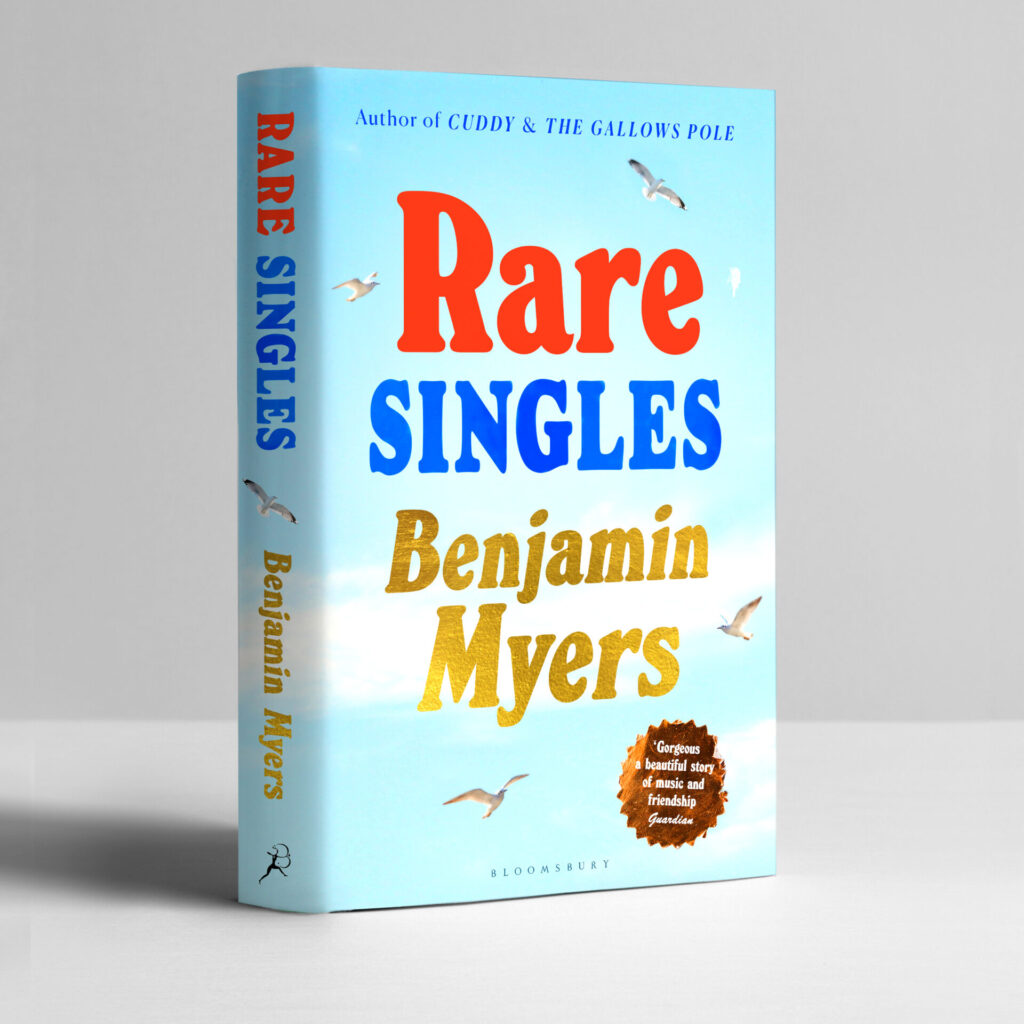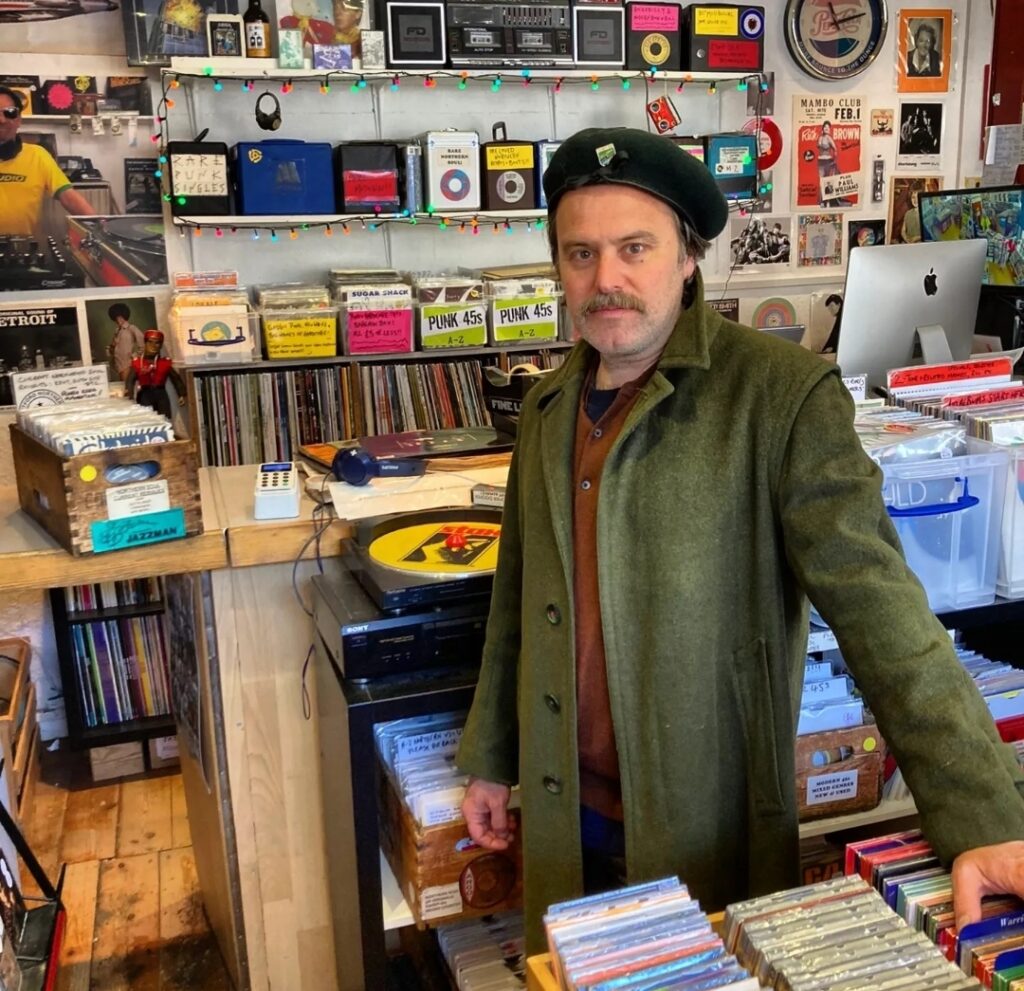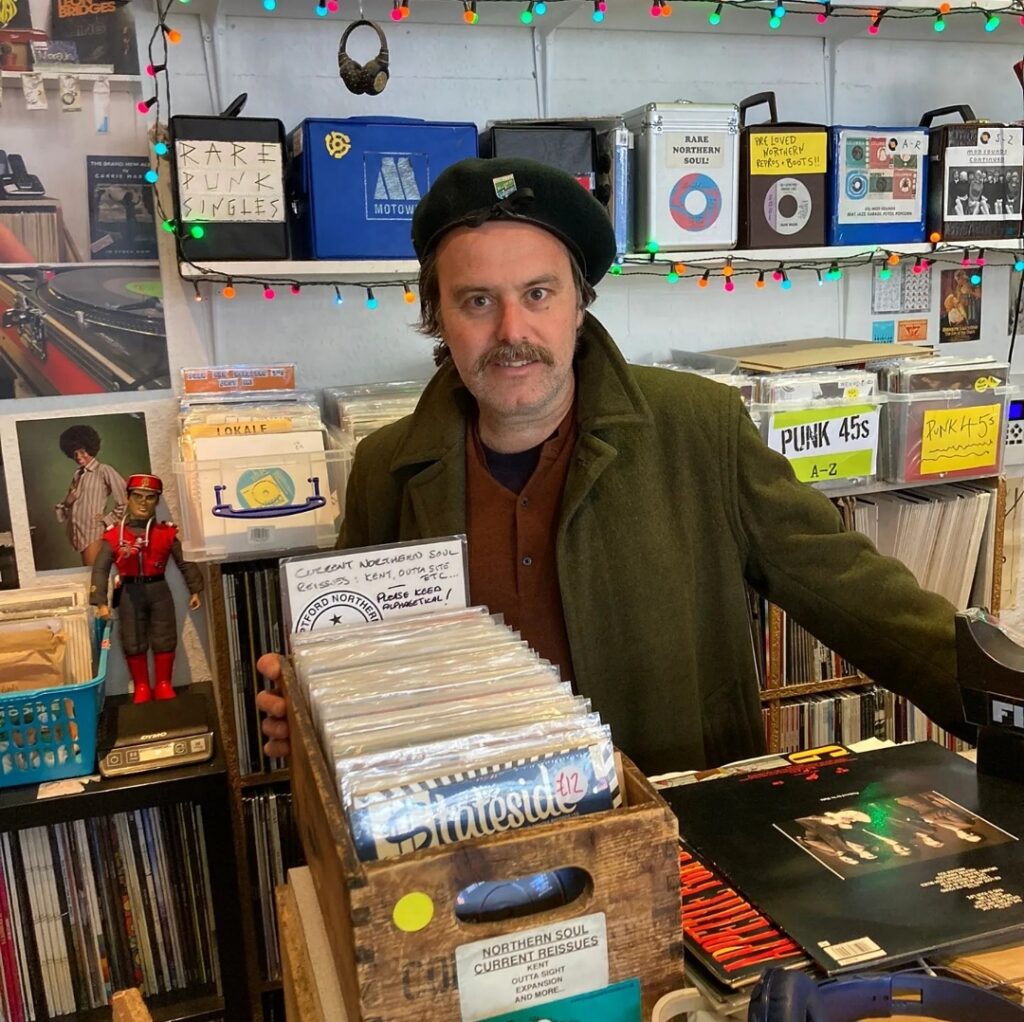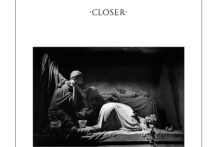My new novel Rare Singles is about a promising fictionalised American soul singer, Earlon ‘Bucky’ Bronco, who cut a seven-inch single as a teenager in the late 1960s, before his career – and his life – was derailed by tragedy. Decades later, now old, ailing and addicted to opioids, he is invited to perform his very limited back catalogue at a Northern Soul Weekender in an off-season English coastal town, and discovers that he is considered nothing less than a God amongst the three hundred or so people for whom his song has been a lifelong soundtrack. So it is a story of second chances, surprises – and the power of a single song.
Only now as its publication approaches, have I realised that the novel is also a celebration of my own lifelong infatuation with the perfect three-minute pop songs. For years I have either been accruing these cheap slabs of plastic or endlessly compiling playlists of songs that fall into the three-minute category. To do so I have allowed myself an entirely arbitrary three second leeway either side, so anything from 2 mins 57 secs to 3 mins 3 seconds qualifies.
You’d be surprised how much great music clocks in at 1 second either side and therefore misses out – sorry to the single edit of The Streets’ ‘Don’t Mug Yourself’ – and how some that feels epic and epoch-making isn’t. Hardcore pioneers Minor Threat, for example, recorded only one song that exceeded the three-minute mark.
But what is it about the restrictive structure of 180 (or so) seconds that still lends itself so well to musicians and listeners alike? Maybe it’s to do with the fact that the post-war pop music, doo-wop and nascent rock & roll that helped spawn a new demographic – the teenager – worked best in short, sharp bursts suited to a young attention span that has only grown more restless over the intervening decades and into the age of streaming. Or perhaps it is tied in with a nostalgia and love for the format that best delivers it: the seven-inch single.
The single is a thing of beauty, and if it comes in coloured vinyl or has been scratched to hell by previous generations before me, then ever better. To me, an early seven-inch by, say, Buzzcocks with its Linder Sterling-designed cover and strong B side is as important an artefact as anything produced by 20th century pop culture.
Even during vinyl’s leaner periods, when I sold off some of my albums, I held onto all my seven-inches – from the 60s records I inherited, the punk and post punk singles I’d buy en masse from a local DJ and even those by the many third division Britpop bands, always bought on spec for 99p from HMV while on a strict student budget; in the 1990s new albums were simply beyond my means if I wanted to even entertain the possibility of a social/sexual life too.
Naturally, pop and punk feature highly, and songs unwittingly find common ground as they offer differing takes on love, lust and infatuation within their allotted 180 seconds. Themes, through-lines and tonal threads emerge – The Rocketeers’ acerbic 1953 cut ‘Gonna Feed My Baby Poison’ sits comfortably along The Jackson 5’s ‘I Want You Back’ (1969), or ‘96 Tears’ by ? & The Mysterians (1966) isn’t out of place next to ‘I Kissed A Girl’ by Katy Perry from 2008. Listened back-to-back, we’re reminded that emotions captured and conveyed by the best three-minute songs neatly transcend their era to become simultaneously of the moment, yet timeless too.

Certainly, a lot can be done within those three minutes: consider the narrative arc of The Who’s ‘Pinball Wizard’, which takes us from Soho to Brighton on the trail of a deaf/mute hero who, without the distraction of bells, buzzers and lights, excels at his chosen game. Or there’s Wu Tan Clan’s ‘Shame On A N*gga’, whose initially impenetrable lyrics give way to an entire lifestyle, lexicon and universe of sound (kung-fu samples, intimidating lyrics, The Warriors references, the rebirth as the rapper-as-superhero-type figure) that fans were soon able to buy into, while also showcasing their strongest vocalists – Ol’ Dirty Bastard, RZA, Method Man – in much the same time it takes to make a cup of tea.
Once you dig into it, one soon realises that the best three-minute songs are masterpieces, precisely because of their concision and brevity. ‘Hounds Of Love’, a fever-dream of a song in which we run with a hunted fox whose “little heart, it beats so fast”, before being deposited barefoot by a lake? 182 seconds long. Credit is due also to The Futureheads for recording a clattering 2005 cover version that satisfyingly clocks in at the exact same length.
The three-minute song works because it does everything it needs to do, and no more – verses, choruses, a narrative, then exit stage right. Within them, worlds are built. Personal favourites include the turbo-charged blues-punk squall of ‘2Kindsa Love’ by The Jon Spencer Blues Explosion, Prince’s heartbreaking ‘I Would Die 4 U’, the nonsense stomp of ‘Wig Wam Bam’ by the criminally under-rated The Sweet, the portentous ‘Up The Beach’ by Jane’s Addiction, or Toots & The Maytals’ ‘Sweet And Dandy’.
I’d also state a case for Sum 41’s irreverent ‘Fat Lip’, with its nods to Green Day, Beastie Boys, emo and power metal perfectly nailing a turn-of-the-millennium white, suburban cynicism that here is ultimately overwhelmed by a sense of joy and wild abandon that comes when its composers are newly-minted teenagers on the cusp of success.
But we’ve barely scratched the surface in considering the meaning these songs have in my life. ‘I’m Going To Free Her’ by Roky Erickson takes me straight back to a past love – a first love, really – and the many nights shared together in a flat in Streatham.
‘Ready Steady Go’ by Generation X found me at fourteen, attempting to form a band, while ‘Merchandise’ by Fugazi had me wondering a year later if music or writing might possibly provide an escape route, while also eviscerating the evils of capitalism, obviously (sample lyric: “You are not what you own”). Ten years later the thunderous ‘Know’ by System of a Down saw me off on tour with the said band, at the beginning of a long and liver-damaging stint as a roving reporter for Kerrang! (though playing it now I’m unnecessarily gutted to find it is, in fact, 2 mins and 56 seconds long – sorry fellas, but you’ve got to go). ‘Pow (Forward)’ by Lethal Bizzle brings me back to tense times in London: protests, riots and street life in Peckham.
Boxes of such singles sit on my shelves, most unplayed for years. Knowing they are there is enough. When I met my wife and she pulled out her far bigger and more impressive collection of post punk and reggae singles (‘Horrorshow’ by Scars!, ‘Wreck-A-Pum-Pum’ by Yellowman!), I knew we were compatible. ‘Baby’ by Os Mutantes is the three-minute sound of that scorching hot summer we met.
Clearly some genres are better suited to the three-minute song than others – prog may not feature heavily, though Gong do a lot in ‘The Pothead Pixies,’ as does jazz maestro Dave Brubeck on ‘I’m In A Dancing Mood’ and The Dubliners with their defining version of the traditional ‘Whisky In The Jar’ (all 2 mins 59 secs). Ultimately the three-minute format is the great leveller, drawing all sound together into the same compact shape that allows us to segue from ‘Sun And Fun’ by Sir John Betjeman to ‘Stoned Love’ by The Supremes; from ‘Penny Lane’ by The Beatles to ‘Ithica 27/9’ by Mogwai.

From there, depending upon our mood, we might go to ‘Hang Out The Stars In Indiana’ by Al Bowlly, ‘Dandelion Blues’ by The Incredible String Band, ‘Speeed King’ by These Animal Men, or the utterly maudlin ‘Death Of A Clown’ by The Kinks. And this wouldn’t be a musical deep dive by a middle aged man without The Fall appearing (surprisingly short on 3 minute songs, we’ll probably have to plump for either ‘Middle Class Revolt’ or the obscure ‘Craigness’), though neither of Mark E Smith’s contributions are on par with The Wurzels’ utterly berzerk cover of Sea Power’s ‘Remember Me’. And obviously Nick Drake must be included here, as he seemingly does on almost every compilation I put together (I’ll go for the haunting ‘Free Ride’ from 1972’s Pink Moon).
Sometimes coincidence plays its part in this game too. Investigating it now as I write, I discovered that one of my (and the world’s) most played singles of the last decade – ‘Humble’ by Kendrick Lamar, with well over two billion streams – is 2 mins 57 seconds in length. Of course it is. Because it’s perfect. Ditto ‘Sloop John B’ by Beach Boys (3 minutes exactly), whose harmonies continually seem to impact me on a cellular level.
I’ve recently been working on turning my novel, Rare Singles, into a screenplay for the cinematic production wing of a major record label. As part of contractual obligations, I have insisted that I get to at least try to write the lyrics for the key three-minute soul single that takes the book’s protagonist Bucky Bronco all the way from Chicago in the 1960s to a stage in present day Scarborough. My argument is, beyond being able to spin a decent yarn, my only skill in life is being able to recognise a good song. Some might regard this as useless. But for many of us, it is the source of more pleasure than they – let’s go for the parlance of old and call them what they are: the squares – will ever know.
A playlist of the songs mentioned above is available here.
Rare Singles by Benjamin Myers is published tomorrow by Bloomsbury.





